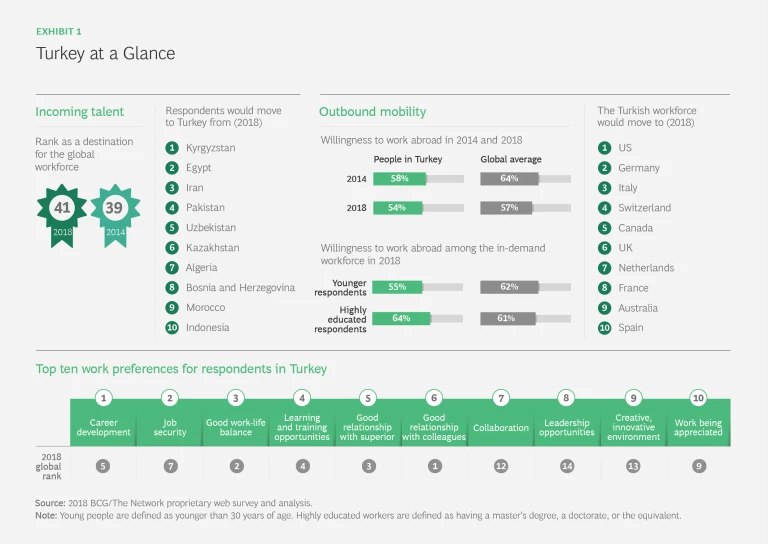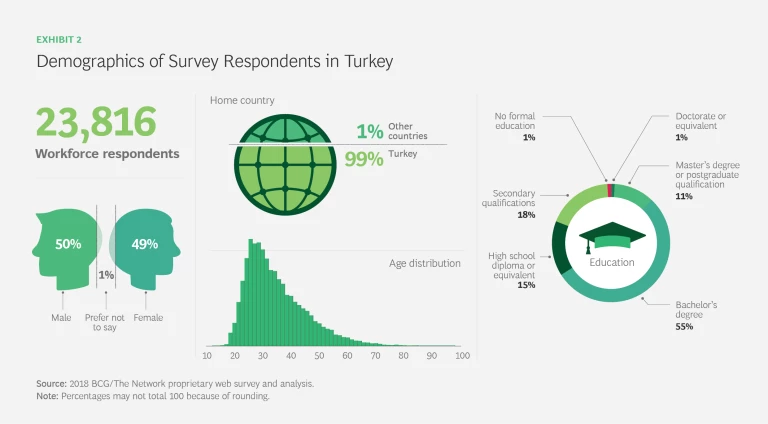This article is part of the series Decoding Global Talent 2018 . The series is based on a survey of 366,000 people in 197 countries by The Boston Consulting Group, The Network, and (in Turkey) Kariyer.net.
T urkey draws from an enviable labor pool. The country has abiding appeal as a work destination for people from nearby regions, and its own labor force is young and growing, a boon at a time when populations in other large economies are aging and shrinking.
On top of that, the country’s domestic workforce is slightly more inclined than most to remain within its borders. Fifty-four percent of Turkish residents say they would relocate for a job opportunity, slightly under the 57% global average, according to a survey by BCG and The Network.
To build on these positives, employers—whether they are Turkish or foreign companies operating in the country—must adjust what they offer to better meet the needs and expectations of local talent. That is especially true for people with advanced degrees or in-demand skills, both groups that are more likely than the average to say they would relocate in order to further their careers. Also more inclined to relocate are younger residents, who value aspects of work that are substantially different from what Turkish employers feel are important. Such a mismatch could lead them to pursue jobs elsewhere as they get deeper into their careers, a possibility that could hamper the country’s future growth.
Read more about the featured countries
Read more about the featured countries
- The US Is Still the Top Work-Abroad Choice, but Its Pull Is Waning
- Germany Rises to Number Two as a Work Destination
- The UK Slips as a Hot Spot for Global Talent
- France Remains a Top Draw but Still Needs More People
- Switzerland’s Appeal Endures Despite a Dip
- Chinese Residents Are Staying Put for Work
- Russia Faces a Talent Conundrum
- Turkey’s Employers Must Capitalize on Ambitious Talent
A Regional Talent Magnet
Turkey remains a moderately popular destination for globally mobile respondents. It continues to rank close to the top 40 in attractiveness, about on par with its standing in 2014. While it is by no means in the top 10, Turkey remains in the top quartile of the 197 countries in our survey. (See Exhibit 1.)
Turkey is most popular with residents of countries in its immediate vicinity, including the Commonwealth of Independent States, the Balkans, the Mediterranean, and North Africa. Residents of Kyrgyzstan, Egypt, and Iran continue to choose Turkey as their preferred destination. In addition, respondents to our survey in Pakistan, Kazakhstan, and Bosnia and Herzegovina ranked moving to the country more favorably than they did in 2014. Turkey is also a popular destination for mobile respondents in Malaysia and Indonesia, reflecting the country’s unique geographic position, bridging Europe and Asia.
One major draw could be the economy, which is growing at a pace that is faster than that of almost every other fellow G20 member. In the 12 months ending March 30, Turkey’s GDP increased 7.4%, topped only by India; forecasts expect it to continue growing by 4% to 5% through 2019. Part of that growth came from incentives offered to the private sector to stimulate local demand.
In addition to being Turkey’s largest metropolis, Istanbul is its economic, cultural, and historic center. In recent years, Istanbul has also become a major leisure travel destination, appearing on MasterCard’s 2017 Global Destination Cities Index as one of the most visited cities in the world. All of those factors could help explain why Istanbul rose in popularity among people willing to move abroad for work, to 43 from 62 four years ago.
People with Sought-After Skills Are More Likely to Move
Turkish respondents are less interested in going abroad for work than the global average (54% v. 57%), which means local companies can still expect to capitalize on Turkish talent.
However, in-demand workers, including people with advanced degrees and specialized skills, are more willing than the average to move. Sixty-four percent of people who have a master’s degree, doctorate, or other form of advanced training would consider moving abroad for work, as would more than six in ten people with jobs in IT (62%) and engineering (63%).
For Turkish residents who would be willing to move abroad, the primary reasons are to broaden their personal experiences and to take advantage of better career opportunities. Securing a better standard of living also matters. One hospital executive who lives in Istanbul tells us that he enjoys what he does but has worked outside Turkey before and would do it again. “I want to have experiences abroad, to adapt myself to another country,” he says. “It’s a great way to improve myself.”
The most popular destinations for Turks willing to relocate have not changed substantially in the last few years. The top choices are the US and Germany . Other European countries including Italy, Switzerland , and Spain and English-speaking economies such as Canada and Australia are also popular choices.
Holding onto People by Offering What They Value
Because the people that employers find the most desirable are also the ones who are most inclined to relocate for work, employers need to adjust what they offer in order to make themselves more attractive.
That applies to how they approach younger Turkish residents, who constitute a significant portion of the country’s population, and of our survey respondents. (See Exhibit 2.)
Thirty-nine percent of the country is younger than 25, and Turkey’s median age is 32, making it one of the youngest countries in Europe.
Turkey’s median age is 32, making it one of the youngest countries in Europe.
Although the country’s younger residents are as content as people in other age groups to stay in the country to work, employers should not ignore the aspects of work they value. The reason: our survey shows that as Turkish residents get older, they are more interested in looking beyond the country’s borders to develop their careers.
If Turkish employers want to leverage the country’s domestic talent pool and keep educated residents from leaving, they need to offer the job features that job seekers want. Compared with the global average, Turkish respondents are more ambitious—they value career development opportunities most of all. They also place a high value on learning and getting an opportunity to lead, along with job security, perhaps because of the dynamic nature of the country’s economy. Survey respondents also care about maintaining positive relationships with co-workers, having an equitable work-life balance, and working in a collaborative, creative style.
However, our findings reveal a significant gap between the job benefits that survey respondents say they want and what Turkish organizations offer. When asked what companies in Turkey are good at, recruiters included in our survey did not list career development and leadership opportunities among the ten most important factors. Nor did they assign a high rank to learning and skill building. For the country’s economy and individual organizations to continue growing, employers need to support the ambitions of Turkish people to learn, lead, and develop, and they need to offer more dynamic career paths.
Additionally, recruiters do not list work-life balance or appreciation for work among the key job factors provided by employers, even though job seekers feel both are important. Turkish employers could certainly improve in these areas, as evidenced by the country’s less-than-stellar ranking on the OECD work-life-balance index, which could reflect the long hours that Turkish employees typically work. Perhaps it’s time for employers to consider more balanced ways of working and to make sure that employees feel appreciated for their time and effort.












